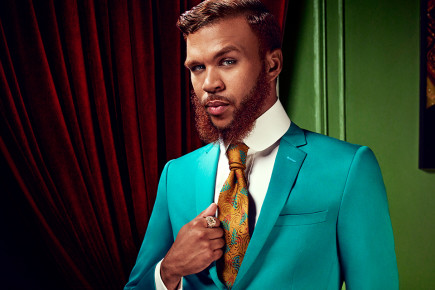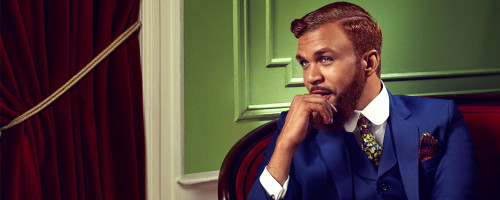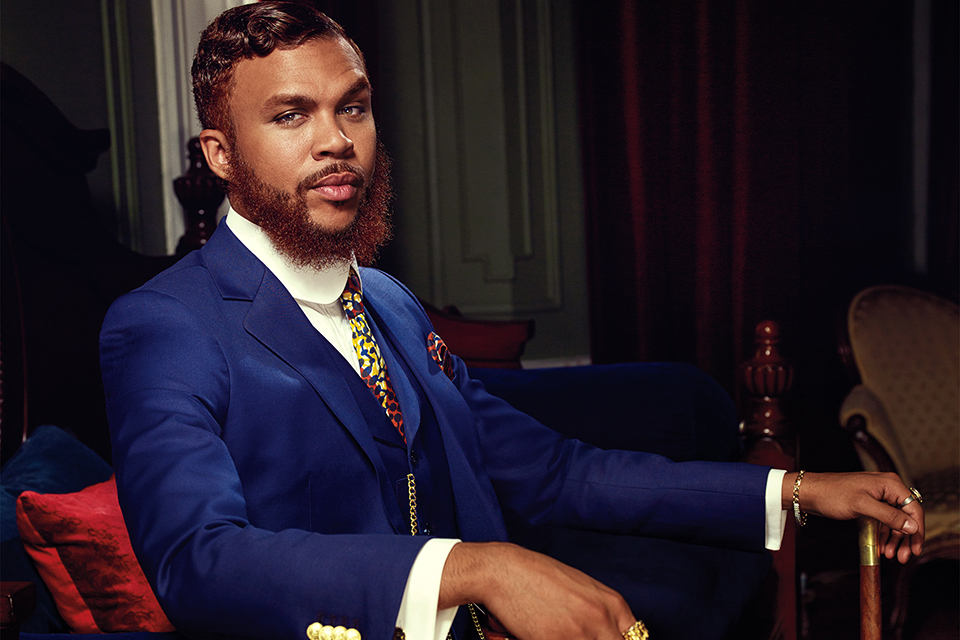His dress, speech, and manner of decency always seem to spawn the same questions, ones that probe into his personal style.
It’s inescapable for Jidenna Theodore Mobisson, the self-proclaimed ‘classic man’, whose artistry occasionally takes a backseat to his flash. His undeniable hook comes in the form of brandished buttons, prohibition era-suits, slicked back hair and well-groomed beards and stashes.
It’s a stark image next to the imagery of the here and now of the mainstream, but he’s never shied away from it.
Jidenna’s assortment of experiences don’t do justice in explaining the artist’s civil rights acumen on paper next to his choice of music.
A product of a Nigerian heritage, born and educated at a boarding school in Massachusetts and college trained in California, Jidenna’s assortment of experiences don’t do justice in explaining the artist’s civil rights acumen on paper next to his choice of music.
He’s coming off of a radio friendly and hit single “Classic Man”, a blend of singing and rapping with lyrics that exemplify exactly the kind of man he’s long since admired, and has now transitioned into a collaborative album through Janelle Monae’s Wondaland Records label called The Eephus.
His words and actions away from the mic may evidently make him polarizing to some, but writing off Jidenna as just another man in a suit may be selling his artistry short.
WE KNOW THAT YOU CAME INTO A GENRE OF MUSIC THAT MAY NOT HAVE BEEN TOO PRO-SUITE IN THIS DAY AND AGE [WHICH IS] VERY NEW SCHOOL AS OPPOSED TO VINTAGE. YOU BOUGHT SUITS AS A RESULT OF GOING TO THRIFT STORES, BUT WHAT ULTIMATELY MADE YOU WANT TO KEEP WEARING THEM, EVEN AS YOU STARTED MAKING MONEY? For me I found meaning in the type of suits that I was wearing. Not just suits in general, if I wear suspenders, sneakers, some of the clothes I wear when I’m walking around, these are all inspired by the Jim Crow era, pre-integration, I dressed according to what I consider to be the fashion of the times. When you go to a wedding, you dress according to wedding rules, when you go to a theatre you dress according to those rules. For me, I look at this era in American history as the new Jim Crow era as far as the relationship between American society and its perception of African Americans … I remember what has happened to us in the past and use that to inspire and dictate how I go about my day, my music, my appreciation for the ancestors, and remind everybody else what time it is. That’s why I continue to refine my artistic style.
I just wanted to make an anthem for those men, and for them to feel empowered when they’re doing simple tasks, like taking out the trash if they’re a sanitation worker, or barbecuing at a party, those are the men that are classic to me.
DO YOU EVER WORRY THOUGH THAT PEOPLE ARE FOCUSING MORE ON YOUR STYLE THAN YOUR ART FORM? It’s all an extension of me, and the culture that I’m around. I don’t mind that people enjoy the image as much as the song. I think after the BET awards, people even started to see the song (“Classic Man”) in a different light. In America, the #BlackLivesMatter movement and a lot of social justice organizations started using this song alongside Kendrick Lamar’s “Alright”, which they thought were songs of the times. That really meant a lot to me to see that, just because I knew that these people and this business, it’s all more than just fashion, it was empowering one’s self, valuing one’s self, not necessarily valuing the clothes, but the clothes can become an extension of you.
I THINK SOME PEOPLE MAY HAVE THIS MISCONCEPTION WHEN YOU SAY ‘CLASSIC MAN’. DEFINE WHAT THIS MEANS. I MIGHT WANT TO BE A CLASSIC MAN, BUT MAYBE I DON’T LIKE SUITS FOR INSTANCE. CHARACTER WISE, WHAT’S YOUR VIEW OF THE CLASSIC MAN? It’s way more about character than it is fashion. I just happened to take a liking to a specific style, but I didn’t write the song looking at all at the different men in suits, I wrote the song looking at the mechanics of the neighbourhood, barbers, the frat boys, the gangsters, the war veterans, these men were men that had composure under fire. They had poise and knew everybody in the neighbourhood. They were gentlemen, yet not afraid to roll up their sleeve. They looked out for people beyond their own family. These were classic men to me, they were heroes like my father was to me and so many other men. I just wanted to make an anthem for those men, and for them to feel empowered when they’re doing simple tasks, like taking out the trash if they’re a sanitation worker, or barbecuing at a party, those are the men that are classic to me. Class is an element for sure, but I think character far outweighs the actual dress of a classic man.
SO GOING INTO WONDALAND, TELL ME ABOUT THE DYNAMICS OF THE [LABEL]. You have people who have very different energies that still co-exist. What comes to mind when I think of Wondaland and what we’re bringing to the world is harmony. Not only do you see harmony within the music, but [also] you see it within the different characters of Wondaland Records. The thing about harmony is that you have different notes co-existing at the same time. Sometimes it can be so pretty and marvelous. [For example] you have a group like Deep Cotton who are kind of the wild, afro punks of the group. They’re liable to throw mic stands and kick monitors in on stage and on the other end of the spectrum you have St. Beauty who are like wild childs who use their music in a way that makes you become introspective … Then there’s Janelle, she’s the leader of the Wondaland Records, and she’s got it all, blessing all of us on stage … the top general of Wondaland Records.
SO HOW DID THIS GROUP ALL COME TOGETHER IN THE FIRST PLACE, GIVEN YOUR DIFFERENCES? We were all friends. We used to hang out together and jam together for years, so it wasn’t a case where Janelle Monae or anyone was searching for artists, we were already around. I met Janelle at the masquerade ball that I invited her to. I was hosting that in Oakland California with my social club Fear and Fancy. We invited her years ago, before her fame and before she signed with Diddy, and after that, we pretty much knew that we were going to be working together and jamming together. We’re kindred spirits, so when we combine, it was just so much magic that we couldn’t contain it. That’s how we met and then everybody else was around in Atlanta, so every time I would fly over there, we’d have jam sessions. Last year we thought to put our jam sessions together and make something for real, something tangible for people to chew on.

YOU GUYS EXIST WITH THE CURRENT HIP-HOP LANDSCAPE, BUT MUCH OF WHAT YOU DO – YOUR STYLE, SONGS – SEEM TO BE A REBELLION TO THE NORM. WHERE DOES THAT REBELLION COME FROM? I think that everybody is unique; it’s just a matter of who’s willing to admit it. I don’t know if we’re rebelling so much as we are embracing. Other people that try to fit in and conform, they’re rebelling against their own spirit and unique attributes. For us we’re just closer to embracing and I think all styles are a form of resistance against something else. Whether you’re wearing a corporate attire, McDonald’s gear, you’re resisting something. You’re saying, I am this, and I am not that. So it doesn’t matter what you wear, it’s saying something about you. How we act, the music we make, our overall style is just a style of embracing what’s up.
THERE ARE CELEBRITIES OUT THERE THAT SOMETIMES USED THE HASHTAG #BLACKLIVESMATTER OR EXPRESSED OPINIONS VIA SOCIAL MEDIA. YOU HAVE PLACED YOURSELF IN IT PHYSICALLY. WHAT’S YOUR HISTORY WITH SOCIAL JUSTICE IN THE PAST AND NOW? I was an organizer for years as well as a teacher in high school. When I was in college I was organizing and when I graduated I continued to organize as well. This has been something that has been a part of what I do for a while. What I will say though is that I don’t think that just because a few people, artists, celebrities, whatever you want you want to call, or people that have also stepped out like J Cole in Ferguson, just because we go out there doesn’t mean other people aren’t doing something. I can’t stand when people point fingers and say, ‘hey so and so should be out there.’ I believe a lot of people care and maybe they’re making their moves in silence, which is just as powerful sometimes. If their move or their actions are really making an impact, then I think that there’s honour in that as well. For me, I care deeply about human energy in general, not just one particular people, but all people existing in perfect harmony.
WHAT’S YOUR VIEW ON PEOPLE WHO HAVE BEEN TRYING TO DISCREDIT THESE MOVEMENTS, LIKE FOR EXAMPLE, SUGGESTING THAT #BLACKLIVESMATTER IS A TERRORIST ORGANIZATION? If people are not discrediting the movement, you could tell, it would not be important. Anything that’s important has people that try to wear it down or tear it apart and destroy it. If there weren’t those people, then we wouldn’t be doing a great job or the actual lead organizers of the #BlackLivesMatter movement would not be making an impact. To me, it makes it clear that they’re making an impact so kudos to them.
A lot of times we don’t honour the simple, middle class dreams. We all want to be super wealthy, superstars on our Instagram. So I wanted to reflect, but also project, a new type of character, the chief.
YOU ONCE SAID THAT MUSIC IS A REFLECTION OF SOCIETY IN AN INTERVIEW, HOW WOULD YOU DESCRIBE THE REFLECTION GIVEN FROM YOUR OWN MUSIC? In regards to the few songs that I’ve put out, these records both speak to what it is and what it could be. Some records show you what it is or there’s a reflection, other records are projections of dreams or my hopes of becoming. When I made “Classic Man” I was reflecting the great men that I knew in my life and that were in my neighbourhood, but at the same time there’s many men that are an acting voice in the world. For me it was reflecting the men that I felt were of honour, that were noblemen, but then projecting that, so that light shines bigger in my hood and the whole world so that young boys that are coming up, and young girls as well, can have that power and feel that value projected across the world. We all have achieved the same idea, but it was more of a reflection of the fact that everybody wants to be a king or a queen, they all want to be billionaires, all of our millennial generation wants to make money, go on vacation and blah blah blah – to me, whereas a king lives on the hill, the chief lives in the village, whereas the king has a castle with a moat and is isolated, the chief is on the streets with the people. I wanted to pay homage and honour to the type of person who is down to earth and cares deeply about people and not just about leaving people and living this lavish luxurious fantasy. A lot of times we don’t honour the simple, middle class dreams. We all want to be super wealthy, superstars on our Instagram. So I wanted to reflect, but also project, a new type of character, the chief, and saying … that maybe a new character is developing within our genre: the classic man.





3 Comments
Pingback: 100 Beautiful POC – Day 43 – Two Roads Diverged
Pingback: AfroChic: Reclaiming Identity - Urbanology Magazine
Pingback: Looking Back at Manifesto 11 - Urbanology Magazine